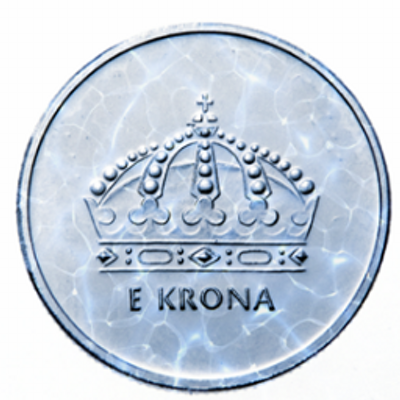
In Scandinavian countries, like Sweden, Norway, electronic payment methods have an 80 percent weight in consumer’s buying, but the cash, only 20 percent. In some South European and East European countries, the opposite or worst: the electronic payment has a proportion of only 10-15 percent. People are still insisting stubbornly on their banknotes and coins. Even in Germany, the most populated country in the European Union, electronic consumer payment has a proportion of only 16,5 percent. (Data of 2016.)
Where the ETF launch is history
Is it a coincidence that Sweden is also one of the most supportive countries of the cryptocurrencies? One sign of this is that, while US authorities are discussing the possibility of a Bitcoin ETF long ago, in Sweden, something similar exists since more than three years (05-18-2015), in form of an ETN. (I wrote about it before here).
The issuer, XBT Provider made later also other series of the ETN in Euros and issued an Ethereum ETN. The products are accessible also from other countries of the EU. (In the US, the SEC suspended the trading of this products.)
Sweden made the homework
There are other supportive, crypto-friendly countries in the world, like Switzerland, Malta, Singapore, Denmark, Australia, Japan. (For example, see this about the taxation.) What makes Sweden different? I think one important factor is the regulation.
In many countries regulation is far behind the reality, many steps have to be made. A lot of countries haven’t approved any regulations, in others, the only job done was issuing several warnings over cryptocurrencies, or discouraging the citizens from investing in them. But Sweden made its homework:
The Swedish Tax Agency has given a preliminary ruling on Value Added Tax (VAT) on bitcoins, stating that trade in bitcoins is not subject to Swedish VAT, but is instead subject to the Finansinspektionen (Financial Supervisory Authority) regulations and treated as a currency. The decision has been appealed by the Swedish Tax Authority.
The Swedish jurisdiction is in general quite favorable for bitcoin businesses and users as compared to other countries within the EU and the rest of the world. The governmental regulatory and supervisory body Swedish Financial Supervisory Authority (Finansinspektionen) have legitimized the fast-growing industry by publicly proclaiming bitcoin and other digital currencies as a means of payment.
For certain businesses interacting with fiat (mainly exchanges) the current regulation dictates that an application for approval/license (Wikipedia)
No word about expenses
Why need Sweden cryptocurrencies if they are already paying almost everything electronically? It can be for a bunch of reasons, like privacy and decentralization, investment and online applications with smart contracts. But I suppose one of them can be really important. Denmark, Sweden, Switzerland are some of the more developed and richest countries in the world. But also with the highest prices, of almost everything, all goods, and services.
I suppose in this countries are living educated, conscious customers and they don’t like to pay too much for services. In the EU, maintaining a bank account with a debit or credit card can cost you on average, by my experience, at least 5-15 EUR monthly. (I wanted to know how much this could be in Sweden but it was impossible. Some banks have no English home page, others aren’t discussing this theme in English.)
A small crypto-exchange
There is a Sweden based Bitcoin exchange, Buybitcoinworldwide.com wrote:
Safello is a Bitcoin exchange based in Sweden and fully-registered as a financial institution. It offers a wide range of payment methods - Swish, SEPA, SWIFT, Faster Payments, Bankgiro and iDEAL - to European residents.
Visiting the page of this exchange, they may be settled in Sweden, but are more Europeans. “Our goal is to be Europe’s most serious actor within bitcoin” – so the plan of the company. But I suppose national – or smaller – exchanges don’t have real future, the strong competition requires mergers and concentration. Allegedly the company was funded years ago, but I couldn’t find it on the exchange’s list of Coinmarketcap.com.
No one ATM?
As a Bitcoin holder, I’m also interested if I could buy with it in stores, bars, restaurants. “We visited Sweden and Bitcoin acceptance is at an average rate” – wrote a traveler this summer.
In the country, seemingly there is no cryptocurrency ATM. While in the US we find 2187, in Austria 234 and in Switzerland also some dozen. Maybe Swedish consumers like their credit cards and are buying bitcoins only for investing? Another explanation is, why should they use ATM if they pay electronically? You practically don’t need cash anymore.
Becoming converts
The Swedish people appear to be true investors:
Avanza estimates that about 30,000 Swedes have become bitcoin converts after investing via XBT Provider’s Bitcoin trackers, which are traded on Nasdaq Nordic. That’s a 50-fold increase from a year ago. In total, Swedes have invested 2.2 billion kronor ($260 million) in bitcoin – wrote Fortune in middle of the hype of December.
Crypto for the poor
But last week I read a really interesting news:
The Sweden Central Bank has announced the intention of designing a digital state-issued cryptocurrency to satisfy the needs of those that still rely on cash to make their day to day spendings. This cryptocurrency would be adopted by people that have failed to adapt to a nearly cashless society according to statistics. (BTCNN)

(Wikipedia)
The fact that a national bank wants to create a cryptocurrency, is very interesting itself, the explanation, even more. They want to address people who aren’t using electronic, cashless methods – I suppose, mostly the poor. If the 20 percent of the consumer purchases are paid with cash, that can mean 25-30 percent or more of the population – because the poor are making fewer payments than the rich buyers.
Open your mind
In many Third World (undeveloped, “emerging”) countries, cryptos can make an important difference, giving electronic services to the poor who are excluded from the “traditional finance system”. (Because they can’t afford a bank account or they are living on places without any bank offices.) But if the Sweden Central Bank is right, the poor in developed countries can be also addressed by cryptos.
The real huge difference for me is, that in a time when other national or central banks are ignoring or prohibiting cryptos, issuing warnings or are making the necessary regulations at a very low speed, this country is trying to advance, progress and benefit from the new technology. Maybe this open-minded thinking is what really counts in this new, technology-driven world.
(Cover photo: Pixabay.com)
The speed and decentralized approach of cryptocurrencies is truly innovating for the financial products for populations in need whether it be for cheaper and fast transactions or to actually afford storing and transacting values. This would increase the freedom of transacting across the world.
The average cost of a debit card in a swedish bank is around 30 eur per issue (as far as I remember). Many credit cards are free as the institutions want you to spend more of course.
Posted using Partiko Android
You got a 96.77% upvote from @bdvoter courtesy of @deathcross!
Delegate your SP to us at @bdvoter and earn daily 100% profit share for your delegation & rewards will be distributed automatically daily.
500 SP, 1000 SP, 2500 SP, 5000 SP, 10000 SP.
If you are from Bangladesh and looking for community support, Join BDCommunity Discord Server & If you want to support our service, please set your witness proxy to BDCommunity.
Nice!
Interesting post to read especially about Bitcoin. Good information friend.
Congratulations @deathcross! You have completed the following achievement on the Steem blockchain and have been rewarded with new badge(s) :
Click here to view your Board of Honor
If you no longer want to receive notifications, reply to this comment with the word
STOPDo not miss the last post from @steemitboard: